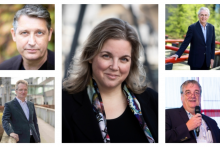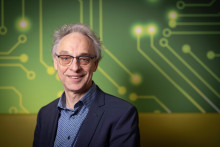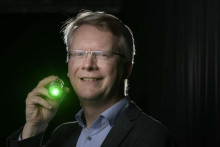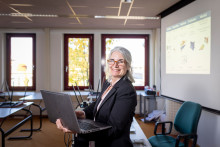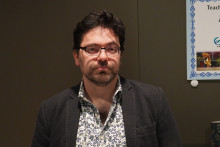Freek van der Meer (ITC): 'Well, it's certainly going to be an exciting year. ITC will move to the campus. Building will commence in two months’ time. Then we can gradually look forward to our new spot on the campus. We have been looking forward to this move to the campus ever since ITC integrated with the UT in 2010. We have little to do with the actual construction; we'll just have to wait. But I am convinced that our new building will put our faculty, and indeed the whole UT, firmly on the architectural map.
An entirely new ITC Faculty Board was appointed last year and this year, together with that new team, we will be focusing on such substantive themes as: GeoHealth (examples of this include identifying infectious diseases such as COVID-19), climate-proof urban growth and biodiversity in combination with food security. These topics will be central themes of ITC education and research over the coming years.'
'It feels as if we're passing 'Go’ on a Monopoly board: it's brought positive energy to the faculty'
Jennifer Herek (TNW): 'Our faculty has grown considerably in recent years. We welcomed many new staff and students. Last year we invested significantly in people, now we need to invest in space. Something we aim to achieve in 2021. Several discussions are currently ongoing in that respect. We hope to be allocated additional space in the Es, a new building next to the Horst complex, for example. A final decision has yet to be made though; the faculties of Electrical Engineering, Mathematics and Computer Science (EEMCS) and Ethics & Technology (ET) have also grown considerably and are looking for extra accommodation. We are working together to find the most favourable solution.'
'We are also working to create more space in a less literal sense, when preparing job profiles for instance. Such as a lecturer with an emphasis on education or commercial knowledge transfer. Not having to adhere so strictly to existing University Job Classification (UFO) profiles allows us more breathing space and flexibility. Another area our faculty will continue to address in 2021 is diversity. And not just gender diversity. The whole university is developing rapidly in that respect, I've noticed. A diversity officer has been appointed and diversity is a central theme in the university's new vision and strategy: Shaping 2030.'
Joost Kok (EEMCS): 'In 2020, plans were made to develop closer links between the three discipline within the faculty. That is about to begin. The government has invested in our disciplines considerably, via sector plans, and it feels like we're entering a new phase. Furthermore, the collaboration with the local government of Apeldoorn continues, the focus of which lies on a secure digital society. We also expect some great innovations in the field of robotics and cyber security. I sense a positive energy within the faculty. It feels as if we're passing 'Go’ on a Monopoly board.
‘The developments concerning the Sport Data Valley lab are on hold, but I see that as the calm before the storm. While Sport Data Valley is a national infrastructure, I also see interesting things happening here in Enschede. The collaboration with TalentNED is good. We help each other forward. Our aim is to assist sport talents with data developments. I'm excited about that.'
'We will return to focusing more on experimental research'
Bart Koopman (ET): 'This year we will be working on our visibility. Many fantastic things happen at ET but too little is often known about that either inside or outside the UT. One of the keys to increasing our visibility is the research support team, led by Timo Meinders. They will help lecturers and individual researchers to achieve their ambitions, for example. We hope to see this reflected in the funding. We have yet to really benefit from any of the major grant schemes.
'We will also return to focusing on experimental research. In recent years the focus has been on numerical research. This led to a reduction in the number of laboratories at the UT. Four large halls in the Horst have been converted into offices, for instance. Besides the numerical research, we want to create more space for experimental research again. That calls for extra labs. One example is the new space for the Robotics cluster. There should be more clarity about the new Robotics location before the summer. It will be a place where students, staff and the business community come together. Where we can really demonstrate what we do, thus increasing our visibility.'
Theo Toonen (BMS): 'This year we want to distinguish ourselves with research. Within the UT, but also by seeking collaboration with the business community. Research plans have been made; the key now is to further develop them over the coming months and make them concrete. The research should also be linked to the Master vision. It is important to really tell a story: I like research to be mission-driven.'
‘The focus of BMS Under Steam, which was completed last year, will also increasingly shift from financial planning to strategic staff planning. Members of staff have left in the past but many new, talented, lively people have joined us in their place. It takes time to structure everything well. I see that we are making steady progress in that respect, but it is going to take longer than a year to achieve.'
(Photo: Freek van der Meer & Joost Kok)
Freek van der Meer (ITC): 'That remains to be seen, of course. I'd say: let's concentrate especially on the positive developments. Last year, UT teaching was completely online within a week. A tremendous amount of experience has since been gained in digital education. Experience will need to apply and expand this year. There are also negative aspects, of course. Experience is one of the reasons ITC come to Twente. They want to be part of an academic community. The challenge this year will be to keep the community together.’
Joost Kok (EEMCS): 'You encounter barriers, limits. There are alternatives for many things but you can't solve everything. Take an oral maths exam, for instance. You can't plan 1200 appointments. Many people are feeling the strain. Strangely enough, though, I've also met people who flourish. People who, thanks to the travel restrictions, suddenly find they can manage their 40-hour working week.
‘The longer this lasts, the more of a drag it becomes. Corona will be around for a long time yet'
Jennifer Herek (TNW): 'The impact will be severe again this year. Interaction is very important in our community. Which is why I hope that more physical meetings will be possible in the course of 2021. The impact of the coronavirus is not all negative, however. I noticed that during the presentation of the UT Media Prizes this week. Two of the three prizes went to TNW researchers. It demonstrates the flexibility and social impact of our faculty in times of a crisis, and I am proud of that. This year we will again be working on several coronavirus-related research projects. These projects offer hope for 2021.'
Theo Toonen (BMS): ‘The longer this lasts, the more of a drag it becomes. Corona will be around for a long time yet. I will be happy if we can gradually return to 'normal’ in September. For a long time, students and staff were prepared to conform but now, understandably, they have ever more questions about the situation, in relation to home study for example. People are starting to feel exhausted and lonely. That makes it hard. It believe it is important to ensure that the faculty is well organised and that the community feels well.´
Bart Koopman (ET): 'I hope we'll be able to party big time again come summer, haha. What I do know is that things will never be entirely the same again. I think work workplace flexibility is here to stay. That said, people will still want to meet up regularly. It's the little things: simply walk across to someone to discuss something. I see the same in relation to PhD supervision. That's such a creative process. Sometimes you just have to be together, put your feet on the table together, so to speak. That's what some people need and what a digital environment can't offer.'
(Photo: Bart Koopman, Theo Toonen and Jennifer Herek)


